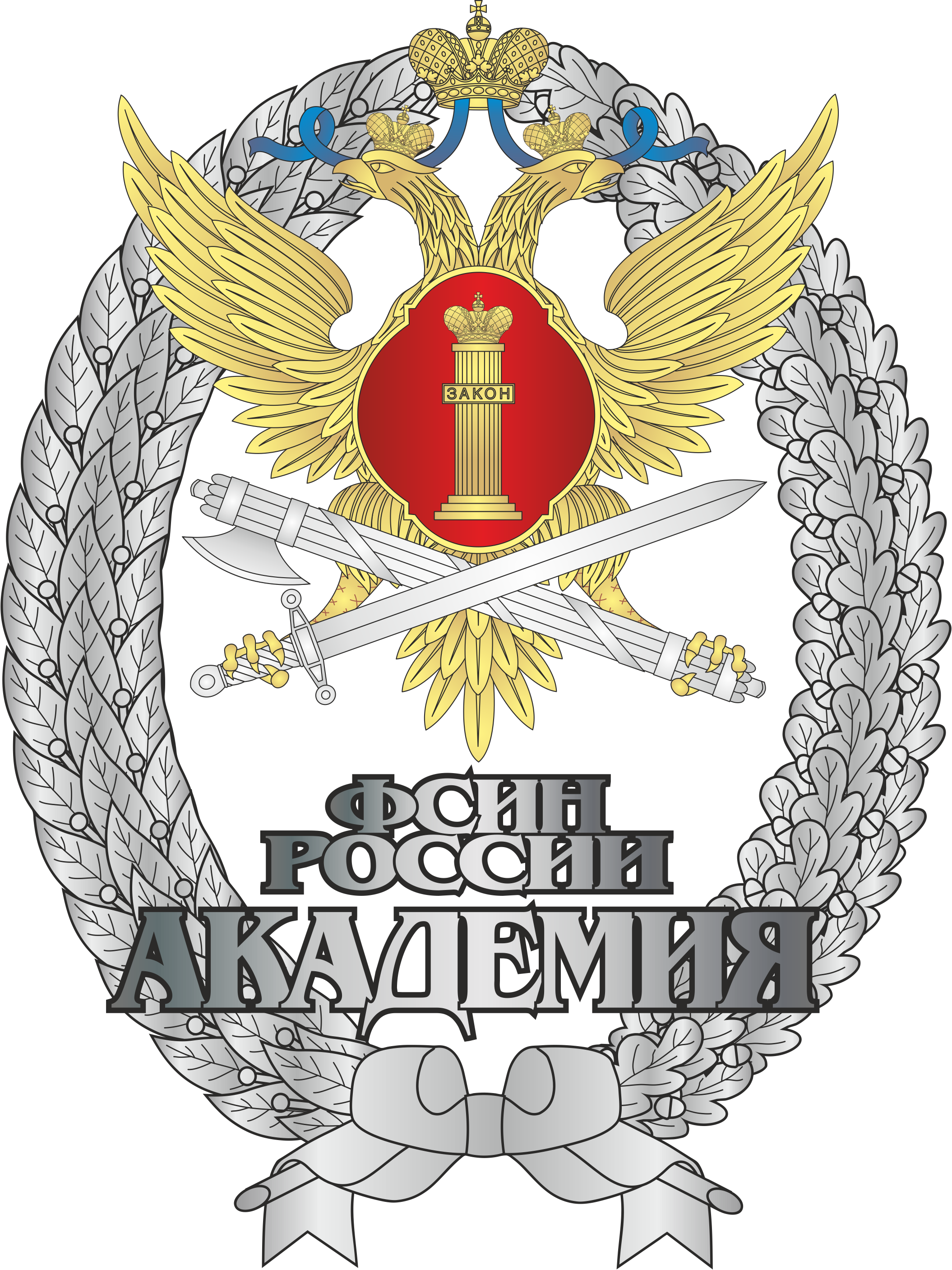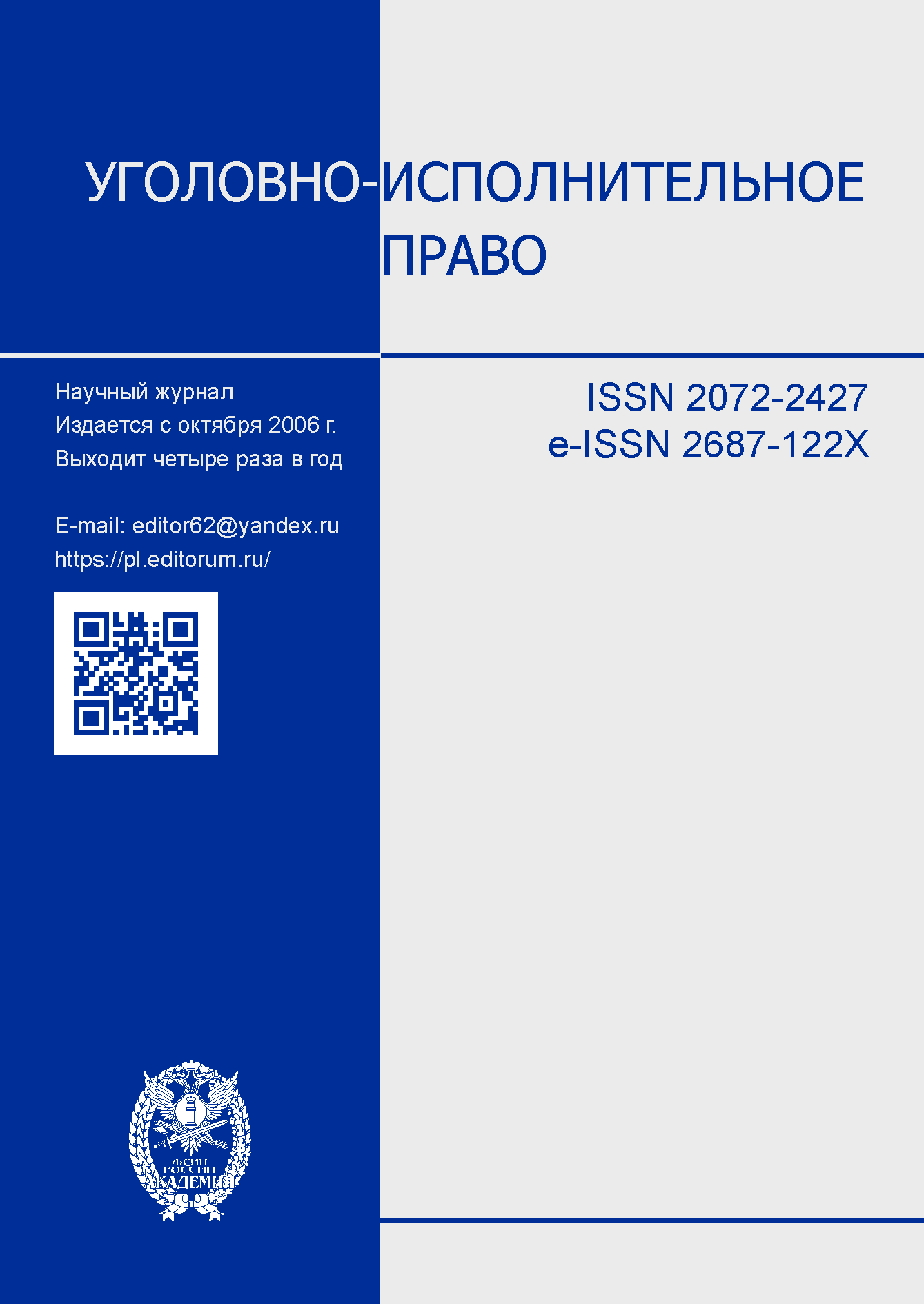Russian Federation
UDC 343.848
UDC 364.04
The article analyzes the problems of correction and re-socialization of convicts and former convicts. According to the author, many issues of correction and re-socialization remain open, there is a lack of conceptual clarity in understanding these processes. The conclusion is proposed for discussion that in the process of re-socialization of convicts and former convicts, two stages can be distinguished – social readaptation and internalization. It is proved that social readaptation as an adaptation of convicts and persons who have served their sentences to new or restored norms and values, social roles can be expressed in obtaining general or additional education, vocational training, advanced training, involvement in paid work, development of mutual assistance among convicts, restoration and (or) development of ties with relatives, friends, colleagues, etc. It is noted that at the second independent stage of re-socialization, the acquired experience, values are reinteriorized with the help of other people, social institutions: they are assimilated, incorporated into the inner world of individuals, turning into a kind of reflex. The article substantiates the position that the process of re-socialization should be implemented through individual social rehabilitation programs and act in accordance with international acts as a way to achieve the main goal – the reintegration of convicts into society. It is concluded that the focus of penal enforcement policy should not be on absolute theories with ideas of retribution, which represent «the criminal as a rational agent weighing the costs and benefits of crime,» but on correctional concepts that see the criminal as a person amenable to correction and in need of support and treatment.
correction, re-socialization, social rehabilitation, convicts, correctional institutions
1. Hovard, J. 1777, State of the Prisons in England and Wales, W. Eyres.
2. Gernet, M. N. 1960, The history of the royal prison, in 5 vols, vol. 1, Moscow.
3. Baranov, Ju. V. & Hamadishin, D. Z. 2011, ‘Rehabilitation and re-socialization as protection of the rights of those sentenced to imprisonment and those released from this punishment’, Current problems of economics and law, iss. 1, pp. 260–262.
4. Efremova, I. A. 2023, ‘Resocialization, social adaptation and social rehabilitation of minors: the essence and correlation of concepts’, Penal law, iss. 3, pp. 304–313.
5. Skiba, A. P. 2023, ‘Resocialization of convicts: some theoretical and legal aspects’, Penal law, vol. 18(1–4), iss. 4, pp. 434–445.
6. Klenova, T. V. (ed.) 2019, Re-socialization and real inclusion of convicts in civil society: monograph, Yurlitinform, Moscow.
7. Bibik, O. N. 2013, Cultural conditionality of criminal punishment: monograph, Yurlitinform, Moscow.
8. Ansel’, M., 1970, The New Social Protection (The Humanist Movement in Criminal Policy), A. A. Piontkovskiy (ed.). Progress, Moscow.
9. Macukevich, O. Ju. 2014, Theoretical and methodological foundations of socio-cultural resocialization of the personality of maladaptants: Sc.D thesis (Pedagogical Sciences), Moscow.
10. Andreeva, G. M. 2004, Social Psychology, Aspect, Moscow.
11. Korel’, L. V. 2005, Sociology of adaptations: questions of theory, methodology, methodology, Science, Novosibirsk.
12. Nomokonov, V. A. 2018, ‘The return of a personal approach is necessary’, Criminal personality and its criminological study, A. I. Dolgova (ed.), pp. 21-29, Russian Criminological Association, Moscow.
13. Shhukina, N. P. & Klenova, T. V. 2020, ‘Re-socialization of persons who have served a criminal sentence and been released from it as a theoretical problem’, Bulletin of the Samara Municipal Institute of Management, iss. 3, pp. 119–126.
14. Juzhanin, V. E. 2015, ‘On the re-socialization of convicts as the goal of the process of ensuring the implementation of punishment in the form of imprisonment’, Penitentiary Science, iss. 4, pp. 9–15.
15. Struchkov, N. A. & Tkachevskij, Ju. M. (ed.) 1983, Soviet correctional labor Law: textbook, Legal literature, Moscow.
16. Baranov, Ju. V. 2008, Re-socialization of those sentenced to imprisonment and those released from this punishment: theoretical, methodological and legal foundations: Sc.D thesis (Law), Moscow.
17. Shhukina, N. P. 2023, ‘On the formation of the probation institute in Russia: is conceptual clarity needed?’, in Main directions for improving the national security system: abstracts of the III International Scientific and Practical Conference (Minsk, November 17, 2023), S. Ja. Azemsha (ed.), pp. 220–224, Stroj-mediaProekt, Minsk.
18. Zoukis, C. 2017, Federal Prison Handbook: The Definitive Guide to Surviving the Federal Bureau of Prisons. Middle Street Publishing, Charlestone, SC.
19. Khan, F. Total institutions and Resocialization in prisons of Pakistan: A qualitative study on prison officials of Punjab, FCCU University, viewed 16 March 2024, https://www.fccollege. edu.pk/wp-content/uploads/M-Fawad-Khan-2210568-Dept-of-Soc.UG-Thesis.Fall2021.pdf.
20. Almeida, F. B., Morandi, M. I., Moreira, W. A., Buzuku, S. & Sellitto, M. A. 2022, ‘Handling the Subjacent Complexity of a Resocialization Program for Inmates: A Systemic Analysis and Leverage Points’, Journal of Open Innovation: Technology, Market, and Complexity, vol. 8, iss. 3.
21. Sykes, G. M. & Matza, D. 1957, ‘Techniques of Neutralization: A Theory of Delinquency’, American Sociological Review, vol. 22, iss. 6, pp. 664–670, viewed 16 March 2024, https:// is.muni.cz/el/1423/podzim2016/BSS166/um/Sykes__Matza_Techniques_of_Neutralization.pdf.
22. Utkin, V. A. 2011, ‘”Correction”, “re-socialization”, “social rehabilitation”’, Legal problems of strengthening Russian statehood: collection of articles, vol. 50, pp. 58–60, Tomsk University Press, Tomsk.
23. Djurkgejm, Je. 1990, ‘On the division of social labor’, On the division of social labor. The Method of Sociology, p. 215, Nauka, Moscow.
24. Osipov, G. V. & Moskvichev, L. N. 2003, Sociology. The basics of general theory, Norma, Moscow.
25. Forsberg, L. & Douglas, T. 2022, ‘What is Criminal Rehabilitation?’, Criminal Law and Philosophy, vol. 16, pp. 103–126, viewed 5 March 2024, https://doi.org/10.1007/s11572-020-09547-4.











